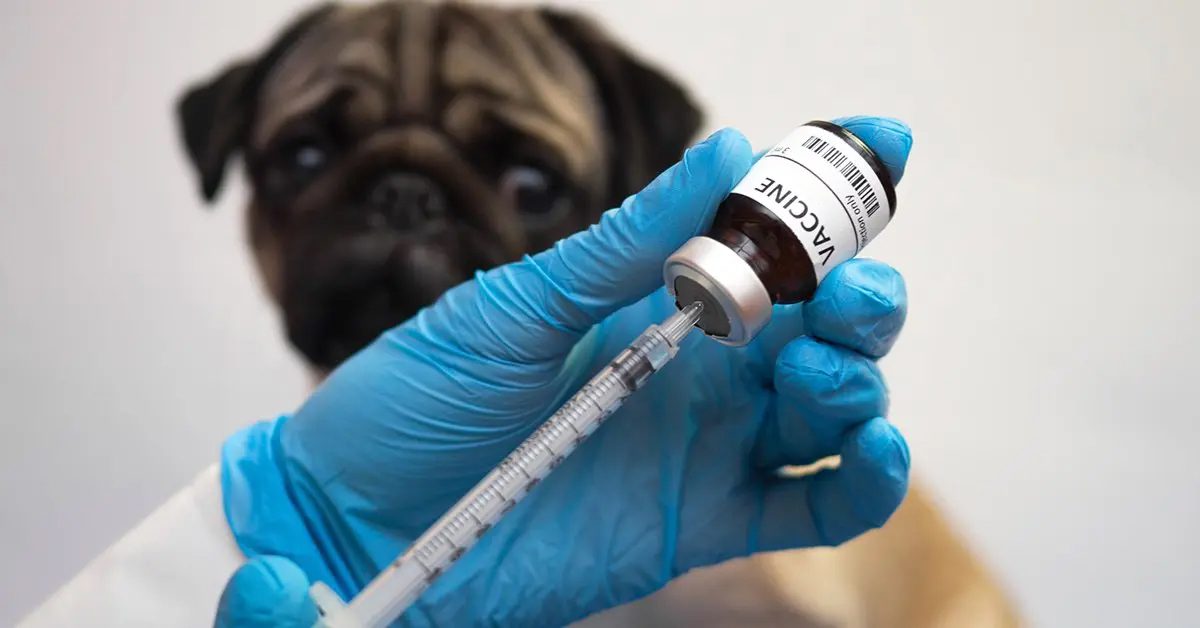Keeping up with your furry friend’s routine vaccination schedule is crucial for their safety and wellbeing – they can even be life-saving. Like any veterinary care, vaccines come at a cost. This may leave you wondering, “Does pet insurance cover vaccines?”
Whether your pet is currently enrolled in a pet insurance plan or you’re thinking about getting one, it’s natural to wonder how much routine vaccines cost and what pet insurance plans (if any) will cover them. Let’s find out!
What is a routine vaccine?
A routine vaccine is a vaccine given to your dog or cat at your veterinarian’s recommendation to help prevent common diseases and infections, like parasite infections. These can be one-off vaccines or annual vaccines. Non-routine vaccines may be prescribed by your veterinarian as a treatment for a particular accident or illness.
What routine vaccines are essential for my pet?
Before we get into coverage, it’s important to understand what routine vaccines your puppy or kitten will need. Getting your pet vaccinated early on in life is one of the most important things you can do as a responsible pet parent. Not only do vaccinations protect your puppy or kitten from infection and disease, but also neighboring pets around them.
But what vaccines are essential? And when should your pet get them? Vaccines are typically broken up into two categories: core vaccines and non-core vaccines. There may be some variation depending on where you live, your pet’s lifestyle, and your vet’s recommendations, but a typical vaccine schedule for a puppy or kitten is as follows:
For kittens, essential vaccines may include:
Six to eight weeks:
- FVRCP combination vaccine. This core combination vaccine can be given as early as six weeks. A total of three to four boosters are given, three to four weeks apart.
Nine to 12 weeks:
- FVRCP booster
- FeLV vaccine (if your vet recommends it). This non-core vaccine can be given as early as eight weeks. A total of two vaccines are given, three to four weeks apart.
12 to 16 weeks:
- Final FVRCP booster
- Final FeLV vaccine
- Rabies. This core vaccine is only given once to kittens. Typically, this vaccine is given at 16 weeks of age.
For puppies, essential vaccines may include:
Six to eight weeks:
DHPP combination vaccine
- This core vaccine can be given as early as six weeks and protects your pup from serious illnesses like parvovirus, distemper, parainfluenza, and adenovirus. Booster shots are given at intervals of two to four weeks until your puppy is around 16 weeks of age.
- After the final shot in the series, your dog should receive another vaccine one year later, and then after that, every three years.
Bordetella vaccine
- For this non-core vaccine on its own (without the parainfluenza combination vaccine), your puppy will typically receive a vaccine at eight weeks of age. There is significant variation in the vaccination protocol depending on the route of administration, age, and lifestyle of your pet. This vaccine helps protect against illness like kennel cough.
Leptospirosis vaccine
- This non-core vaccine can be given as early as eight weeks of age, with a second dose 3 weeks later. A booster is administered annually.
Lyme disease vaccine
- Just like the Leptospirosis vaccine, your puppy can receive the Lyme disease vaccine as early as eight weeks of age, with a second dose 3 weeks later. This non-core vaccine has a booster that is administered yearly.
Canine flu vaccine
- Puppies can receive the non-core canine flu vaccine as early as six to eight weeks. Two shots are required, at an interval of two to four weeks. Yearly boosters are recommended.
12 to 16 weeks:
Rabies vaccine
- Considered a core vaccination, your puppy receives one rabies vaccination as a puppy. Typically, 12 weeks old is the earliest the vaccine is given, but in some states the rabies vaccine is administered closer to 16 weeks of age. At your puppy’s one year check up, talk to your veterinarian about which type of vaccine your pet will receive – one or three year labeling. It’s around this time that your puppy may also receive their final DHPP booster.
How much do vaccines cost?
The cost of vaccines varies across veterinary clinics. It often depends on whether shots are administered one at a time or as part of a bundle. Per shot, vaccines may cost anywhere from $15 to $50, with additional expenses such as vet visit fees. Some vet clinics offer packages including vaccination services, which may be more expensive, but often include multiple additional services such as heartworm prevention or spay/neuter surgery, helping you give your pet well-rounded preventive care.
All told, you might spend over $100 annually on vaccines and boosters – but remember, this is just one of many costs that come up during your puppy or kitten’s first year of life, and is one of the most important ones.
Do pet insurance plans cover vaccines?
Standard pet insurance plans typically do not cover routine vaccines because they are a form of preventive care, a.k.a. routine care to help your pet maintain a clean bill of health. Coverage varies between pet insurance policies, but in many cases, preventive care services cannot be covered by standard pet insurance plans. Under the umbrella of preventive care, you’ll also find care services like parasite screenings, spay/neuter procedures, microchipping, grooming, routine dental cleanings, and more. If they are not covered, these will usually be listed under the exclusions section of your plan policy document.
Standard pet insurance plan options usually offer accident and illness coverage. This means they’re designed to help pet parents pay for the eligible vet care their pets need when unexpected covered accidents or illnesses pop up. Pet insurance helps by reimbursing pet parents for a portion of their covered vet bills.
Coverage varies between pet insurance policies, but in many cases, standard pet insurance plans do not cover routine vaccines because they are a form of preventive care, a.k.a. routine care to help your pet maintain a clean bill of health. Under the umbrella of preventive care, you’ll also find things like spay/neuter procedures, microchipping, parasite screenings, and more.
Most pet insurance plan options won’t help you pay for your annual physical examination fee, but many can help you pay for covered diagnostics and treatment if your pet has an accident. For example, if your pet breaks their paw, pet insurance may help cover the x-ray, cast, and pain medicine.
Cats and dogs eight weeks or older can enroll in a Pumpkin plan. Once their coverage goes into effect, you can get up to 90% cash back on eligible vet bills for illnesses, accidents, and injuries. Fetch a free quote here!
If you do need some help paying for annual vaccines and other routine pet care to stay within your budget, there are providers that also offer optional, add-on wellness packages designed to reimburse you for certain routine care costs. Let’s talk about that next!
What is a preventive care or wellness package?
A wellness package or plan, sometimes referred to as wellness care coverage, or preventive care coverage, helps pet parents pay for their pets’ eligible routine care costs such as the annual checkup fees at your vet, parasite prevention, and routine vaccines. Though benefits may vary, a pet wellness plan or package may be available as a stand-alone non-insurance product or an add-on to a standard insurance plan.
How do wellness packages reimburse vaccine costs?
A wellness package typically reimburse pet parents for eligible wellness expenses based on the claims they file after the services are received. This means that you will usually pay your bill for the wellness care, then file a claim with the provider of your wellness package. If approved, you will get reimbursed for the eligible cost or partial cost of that veterinary care.
If you’d like to be reimbursed for routine vaccines, it’s a great idea to look into wellness coverage for your pup or kitten as soon as possible. The earlier in their life you set them up with wellness benefits, the more years of essential wellness care your pet can be eligible for. Planning ahead to get the veterinary care your pet needs is key to helping keep them happy and healthy.
Enrolling in a dog insurance or cat insurance plan also plays an important role in your pet’s long term health by helping you provide the best care possible when your pet gets hurt or sick.
Pumpkin offers a unique wellness package called Preventive Essentials. It’s not insurance, but an optional benefit you can add to your Pumpkin plan. Preventive Essentials gives pet parents a 100% refund for three crucial routine services all pets need: their annual wellness exam fee, key vaccine(s), and select parasite screening test(s). Click here to learn more and see if Preventive Essentials could be right for you.
What’s the best pet insurance plan for my pet?
When it comes to choosing the best pet insurance plan for your pet’s needs, we say research and comparing different plans is the most helpful thing you can do! Check out our compare page for help exploring different pet insurance plan options.
DISCLOSURE




